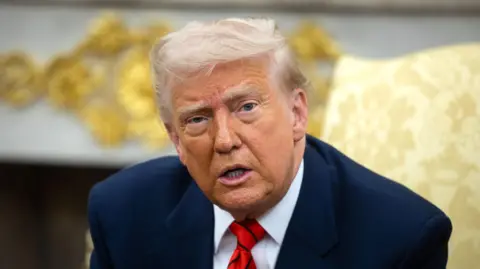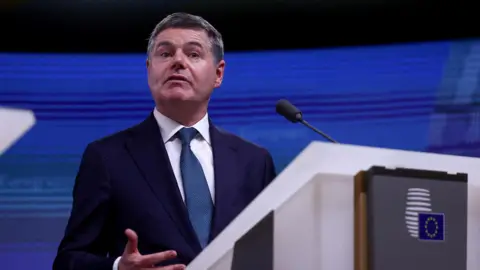Ireland revises economic forecast in face of Trump tariffs
 EPA
EPAThe Irish government has revised down its economic growth forecasts due to global uncertainty and warned that a transatlantic trade war will lead to a further economic weakening.
It expects Ireland's domestic economy to expand by 2.5% this year, down from an earlier forecast of 2.9%.
In the event of a tariff war between the EU and US, it said growth this year would be forecast at 2%, falling to 1.75% next year.
The forecasts are for a measure known as Modified Domestic Demand (MDD) which strips out the distorting impacts of multinational companies.
 Reuters
ReutersThe Irish Finance Minister Paschal Donohoe said: "The more contested and fragmented world that is now taking shape represents a serious headwind for the Irish economy which has benefited so much from the rules-based, multilateral trade system.
"Even in the absence of any further changes in tariffs, there is evidence that firms and households are adopting a 'wait-and-see' approach.
"In other words, they are holding off on big-ticket purchases; this is also a feature in other economies."
Irish exports to US
Ireland's economy is among the most exposed to the potential impacts of US President Donald Trump's tariffs.
Tariffs are effectively taxes applied to goods imported from other countries.
In 2024, Irish goods exports to the US were worth €73bn (£61bn), almost a third of the country's total exports, with a particular concentration in pharmaceuticals.
Ireland's goods exports to the US surged by more than 200% in February as companies worked to get goods into the country ahead of any new tariffs.
In April, Trump imposed a minimum tariff of 10% on almost all countries, while proposing extra "reciprocal" duties for some trading partners, including 20% on the EU.
He later suspended the reciprocal measures, giving partners 90 days to negotiate.
On Tuesday, the EU's Trade Commissioner Maros Sefcovic said the 90 day pause is also being used to prepare further countermeasures if talks fail.
"We do not feel weak. We do not feel under undue pressure to accept a deal, which would not be fair for us," Sefcovic told the European Parliament.
